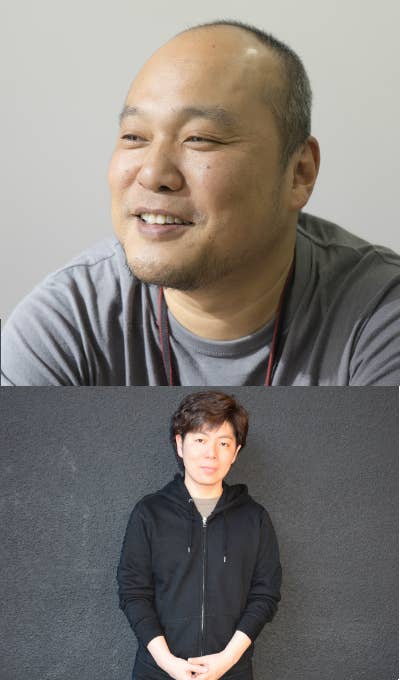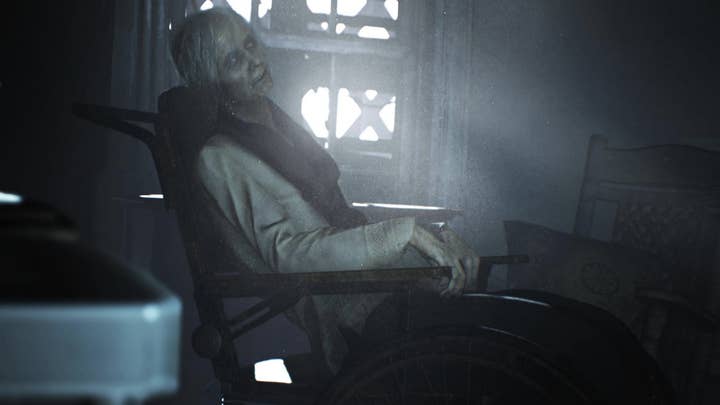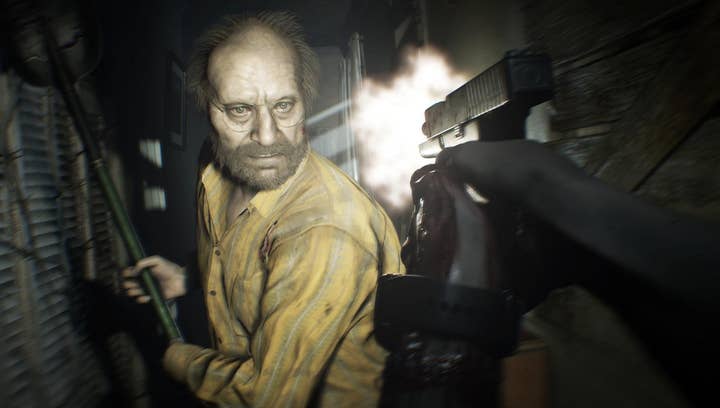Has Capcom saved Resident Evil?
The development team discusses VR, sales trends, horror and building one of the riskiest Resident Evil games to-date
That bloody mannequin finger.
In the summer of Pokémon Go Mania, it is easy to forget that there was a different obsession gripping fans of another iconic 1990s franchise. The Resident Evil 7 demo (released during E3 last June) was a creepy experience where you had to escape a dilapidated house owned by a murderous family. It went down well with horror fans; so well in fact, that when players stumbled upon a seemingly useless item - a mannequin finger - it turned into an obsession. Twitch streamers would play the demo for hours on end in an effort to uncover its mystery, theories would pop up on forum threads that would go on for hundreds and thousands of pages, and my inbox was full of friends - as if I had some insider knowledge - asking me: 'What does the finger do? Will it get me out of the house?'
"We were really surprised by all that," says Resident Evil 7 producer Masachika Kawata "We were planning to update the demo, but also leave a few loose threads, imply bigger things and just have odds and ends for you to discover, and one of those just so happened to be a mannequin finger. But the fact that it became such a focus of people's attention, that was something that took us quite by surprise."

Game director Koshi Nakanishi adds: "It certainly put a lot of pressure on us to put out the next update to the demo. We went faster on that than we had originally planned because of the explosive buzz around the finger. We didn't want people to wait too long. This was the summer of last year, so we were working on a demo update while we were also in the middle of the development of the main game. Doing those things in parallel was certainly difficult for us."
The Resident Evil 7 demo was a strategy that certainly seemed to work for Capcom. The concept was borrowed almost wholesale from Konami, which announced its horror game Silent Hills via the demo PT. Silent Hills was cancelled soon after and PT was removed from the PlayStation Store, disappointing horror game fans the world over. Capcom capitalised on that, although Nakanishi and Kawata insist its decision to do a demo was more about educating fans than anything else.
"With the launch announcement trailer for Resident Evil 7, we made a promise that we were going back to horror," Nakanishi explains. "So we wanted to have a horror-focused demo that told gamers that they can trust us when we say: 'Resident Evil is a horror game once more'. At the same time, it wasn't the right moment to tell everybody about everything that is in the game in terms of gameplay. We wanted to get them on-board with the horror aspect first, and then the rest of the dominoes could fall. That's why we decided to have a demo featuring just horror and no combat. Yet as the campaign progressed, and people accepted the new direction, we started to announce more details about characters and combat, and we could update the demo."
Resident Evil 7's reviews have just started to emerge, and the reception from critics is that Capcom has managed to rejuvenate its biggest IP after a couple of disappointing releases.
In particular the last game. Resident Evil 6, released in 2012, sold well but received a kicking from the consumer press. The game was bloated and more an action blockbuster than a horror game. However, although critics - and die-hard fans - were disappointed by the direction the series had been heading in, the franchise's popularity had never been higher. Resident Evil 6 is the second most successful game Capcom has ever released, just behind the equally action-orientated Resident Evil 5.
So why the change back to horror?

"From a business perspective, Resident Evil 6 was a success," acknowledges Kawata "But we had pushed that style of Resident Evil gameplay, with the big storyline and the hero characters, pretty much as far as we could. It was a blockbuster scale of game. That almost left us with no choice but to change the series in order to keep it alive, because where do you go after that size and scale of game?"
He continues: "Certainly if you compare the sales of Resident Evil 1, 2 and 3 as a unit [the more traditional horror games], and compare it to Resident Evil 4, 5 and 6 [which are more action-orientated], the sales were a lot higher on the more recent titles. But that's not just because of the types of content, we have got better at selling our games. The market has got bigger as well. So just because we are going back to horror, I don't expect we will see a drop to historical levels. The whole company is behind this title and the horror approach, and I'm confident that we are going to do well with this one.
"We also take a look at lifetime sales, and not just day one. Because some fans might be on the fence a bit, and be unsure about the new direction. So whether or not that has an effect on our initial out-of-the-gate sales, I am not sure yet. But over the lifetime of the product, I'm sure we will be able to hit our targets."
"Although the situation with horror games is not the same as it was the last time we released a mainline title, we do still feel we can appeal to a lot of people, including hardcore horror fans.
Masachika Kawata, Capcom
The survival horror genre has had an interesting few years. Via the indie scene, it's enjoyed somewhat of a renaissance via the likes of Slender Man and Outlast. However, the results have been mixed in the triple-A space. In 2014, Sega released Alien: Isolation, while just a few weeks later Bethesda launched The Evil Within (which was from the original creator of Resident Evil). Both titles were well received by critics, but commercially they failed to dissuade the theory that the survival horror genre was past its prime.
"The market for horror games has changed over the years, I suppose," Kawata adds. "But Resident Evil has always been a series that keeps up, it isn't afraid to change the style of gameplay. We have evolved a lot over the years in order to meet the needs of the market and our fans. So although the situation with horror games is not the same as it was the last time we released a mainline title, we do still feel we can appeal to a lot of people, including hardcore horror fans.
"And the fact that we have rival titles in the horror space is not a bad thing, because it only increases the market for horror games as a whole. And we will do the same when we release this game. There will be a further hunger for more horror games in general, and that can only be a good thing for us in the long term."

Resident Evil 7 brings back many of the classic components of past games in the series, including item management and save rooms. There's also a huge mansion to explore, which evokes memories of the very first title in the franchise. It still feels distinctly like a Resident Evil game, but the developer has made a number of major changes, particularly in terms of the perspective. Whereas all the mainline Resident Evil games have adopted a third-person view, Resident Evil 7 has gone first-person - and for the first time since the Gun Survivor/Dead Aim light gun series on PlayStation 1 and 2. It follows in the footsteps of Outlast, Slender Man and Alien: Isolation, which also used a first-person view.
"The first-person perspective is one way to make any kind of game, it is an option that you have at any time," Nakanishi says. "And as Kawata-san says, after Resident Evil 6 we had to reflect upon what the series was and where it was going. Some fans had said that Resident Evil 6 had lacked focus, and I wouldn't disagree, and it was certainly one of my concerns in terms of how far we were going in that direction. So bearing that in mind, having a more focused, scarier, intimate Resident Evil was needed. We wanted to be able to not only do that, but also bring this more focused and scary experience to players in a very fresh and novel way that hadn't been seen before in a Resident Evil.
"Some fans had said that Resident Evil 6 had lacked focus, and I wouldn't disagree."
Koshi Nakanishi, Capcom
"If you have a mission in mind to make a very immersive, atmospheric survival horror game, first-person is a good way to achieve that. The first-person viewpoint was more an obvious answer in terms of how to achieve our goals for Resident Evil 7, than being particularly inspired by any other external influences in the horror genre."
That first-person perspective also enabled Capcom to capitalise on another new trend in the games sector - virtual reality.
"Going back about two and a half years, when we decided on the first-person perspective, it was obvious to say: 'Oh you could do VR because first-person is the typical VR experience'," he explains. "But it was just a vague idea at that point, and it wasn't until later in development that we actually implemented VR. It was something that was relatively easy to do since we were at a stage where we had an atmospheric first-person experience in place."
Nothing was cut from the game to better fit VR, but there were a few tweaks, including measures to reduce camera shaking in order to "make VR more comfortable". Yet one thing the studio was a little concerned about is how scary the experience can be. The game is obviously meant to be frightening, but as anyone that played the demo at E3 will tell you, being completely immersed in that house can be quite an overwhelming experience. At E3, Capcom reps were recounting stories to me about how several journalists had asked to have the headset removed.
"When people are playing the game in VR for the first time, you do find yourself telling them not to push themselves and respect their own personal limits when it comes to intensity of experience in VR," Nakanishi says.
Kawata adds: "I would almost recommend that if people are not sure, or think VR is too much for them - even if you have a PSVR at home - there's no pressure to use it when you play the game for the very first time. Play the game normally first, see how you like it, see how scary it is for you on the TV, and then consider whether you want to jump into the VR mode. As it is so easy to change into VR as well, you can just take it at your own pace.
VR and first-person aside, some of the other changes Capcom made was in terms of development approach. As well as building a new engine (aptly titled the RE Engine) the team also adopted photogrammetry when putting items and even actors in the game. Capcom would fully scan the subject and simply place it in the game, with no need for additional drawing. The firm hopes this had improved the realism of the experience, although it wasn't without its challenges.
"With photogrammetry, the actors needed to be in costume, they needed to be wearing movie-style make-up so that they look exactly like we want for the final game."
Koshi Nakanishi, Capcom
Nakanishi concurs: "You get quick results, although the preparation takes a lot more work. Actors were difficult. Whenever you scan an actor, what I would prefer to do - and have done in the past - is take that scan and touch it up, but with this it tends to head into unrealistic territory. It doesn't look good if you have a scan and start fiddling with it. So you have to get it really right at the scan stage. So the actors need to be in costume, they need to be wearing movie-style make-up so that they look exactly like we want for the final game. That way, once the scan is done, then you pretty much have the final result. That sort of preparation was a lot more difficult than with other processes."
There's also been a significant change when it came to writing. Resident Evil has a reputation for terrible dialogue, and fans would argue that's part of its B-movie charm (although it's probably more to do with bad translation). It's never easy for a Japanese studio to try and build a convincing game set in a Western environment, and so the team hired Texan writer Richard Pearsey (best known for FEAR and Spec Ops: The Line) to help them Westernise its latest effort.
"The reason we hired Richard was for cultralisation, really," Nakanishi explains. "The series is famous - especially the first titles - for having weird, cheesy english dialogue. Things like: 'You were almost a Jill Sandwich'... it's well known by now. It's been part of the fun of the series in many ways, but you certainly couldn't say the old lines were especially naturalistic. Coming to the modern day, although we love that classic stuff, if you want to make a serious horror game, you need to have a natural dialogue. It has to feel right and can't be something that's been translated badly from Japanese, or whatever.
"So at Capcom, we worked on the flow of the game from start to finish, and put in place the general storyline. And then Richard made the dialogue make sense, polished it up for us and made suggestions on how to make things stick together better. So that when the player plays it, it feels like almost natively Western."
There's still a level of uncertainty over whether the game will be successful. There are question marks over the genre, the impact of previous disappointing Resident Evil games and the fact it's coming out in January - a month not known for high game sales. You could also argue that in today's uncertain political and economic environment, we could probably do without a horror game.
Even so, this is the most impressive Resident Evil title since the groundbreaking Resident Evil 4 in 2005. And it's been backed by a major PR and marketing campaign - including some inventive live-action experiences and those expansive demos. Capcom has given it its best shot, now it's a case of seeing whether the market responds.
